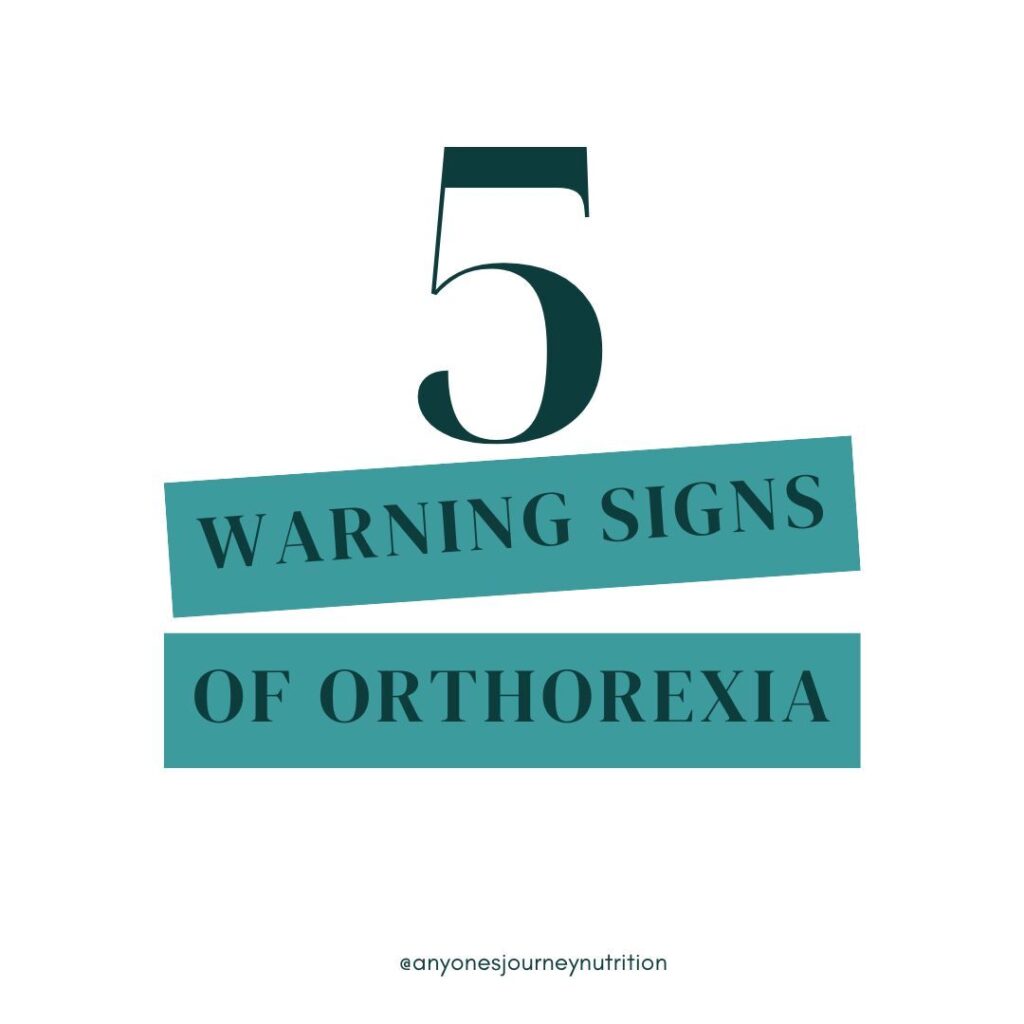What happens when healthy eating becomes unhealthy?
Orthorexia reflects a profound preoccupation with healthy eating to the point where it becomes detrimental to one’s overall well-being.
This blog navigates the warning signs and symptoms while helping you gain a deeper understanding of the complexity of orthorexia.
Plus, it offers actionable steps to help improve your own relationship with food while ensuring you can take a compassionate approach to support others who may be struggling.
Let’s get started!
What is Orthorexia?
Orthorexia is an obsession with healthy eating that is characterized by alarming signs and symptoms.
Although it is not recognized in the Diagnostic and Statistical Manual (DSM) as a formal eating disorder, orthorexia should be taken seriously.
Individuals with orthorexia may become consumed in a pursuit of dietary perfection by strictly adhering to self-imposed rules about food choices and often eliminating entire food groups.
This fixation on healthful eating can lead to significant physical, behavioral and emotional consequences including malnutrition, anxiety and isolation.
Recognizing the difference between health-conscious eating and orthorexia behavior is crucial for overall well-being.
Can Orthorexia lead to an Eating Disorder?
Yes! Orthorexia shares many similarities with other recognized eating disorders such as anorexia nervosa and bulimia nervosa.
The obsession with healthy eating and food quality can evolve into more restrictive or extreme disordered behaviors, which could lead to the formal diagnosis of an eating disorder.
At Anyone’s Journey, we work alongside our clients to help fact-check beliefs around food and body that may or may not be accurate.
Our team of registered dietitians is trained to help our clients recognize the impact of orthorexia then challenge the feelings and emotions related to specific behaviors.

Top Five Warning Signs of Orthorexia
Like many types of eating disorders, orthorexia can present with a range of signs and symptoms that collectively indicate that an individual’s fixation on healthy eating has transitioned into an unhealthy obsession.
Warning signs and severity will vary depending on the individual. It is important to note that you or your loved one does not have to present with one of these risk factors for there to be a concern or further support needed.
Here are the most common warning signs that present in individuals:
- Obsession with Food Quality
An intense fixation on the quality, purity and/or cleanliness of food, which leads to an obsession to only consume food that is perceived as “healthy” or “clean”. The individual also takes extreme measures to avoid foods they consider “unhealthy”.
- Strict Food Rules
Food rules are often created over time to dedicate what and when an individual can eat. It also usually involves eliminating specific foods or entire food groups.
- Emotional distress around health
An individual can experience intense anxiety and guilt when faced with a food choice that may not align with his/her perceptions or food rules. This can lead to negative emotional responses and feelings of failure.
- Social isolation
Withdrawing from social activities, especially those that involve food, is a common behavior. Individuals will only engage in gatherings or events that fit their strict criteria because of the fear they may be exposed to “unhealthy” foods.
- Physical health issues
Lastly, many experience a wide array of health problems such as significant weight loss, fatigue or gastrointestinal disturbances as a result.
More Warning Signs and Symptoms of Orthorexia
Physical Warning Signs
- Slow or rapid weight loss
- Malnutrition
- Mild or extreme fatigue
- Digestive issues
- Hormonal disturbances
- Dry skin
- Brittle hair
- Weak bones
Behavioral Warning Signs
- Strict food rules
- Excessive meal planning
- Elimination of specific food groups
- Judgment of others eating habits
- Avoiding “unhealthy” foods at all times
Emotional and Social Warning Signs
- Perfectionism and/or self criticism
- Anxiety or preoccupation about health
- Irritability and mood swings
- Depression
- Low self esteem
- Social withdrawal or isolation
- Rigidity in thinking
- Poor or limited relationships
- Overemphasis on health topics in conversations
Recognizing Orthoreixa in Yourself
Recognizing orthorexia in yourself is an essential step towards developing a balanced relationship with food and your body. Here are some steps to consider taking:
Developing Self Awareness
Start with developing a greater sense of self-awareness and taking an honest evaluation of your thoughts and behaviors around food. Using the list of symptoms of orthorexia above, acknowledge if you struggle with any specific warning signs.
Finding Support
Share what you have learned about yourself with a trusted friend, family member or a healthcare professional. These individuals can offer emotional support and understanding.
While intimidating, it can be helpful to discuss any concerns or struggles with a supportive network.
Healthcare professionals such as a therapist, registered dietitian or primary care physician can provide a proper assessment and connect you with additional resources within your community. Even though orthorexia is not a formal eating disorder, it can be helpful to find a healthcare team that does have experience with eating disorders or disordered eating.
Practicing Self Compassion
Accepting that you may have developed any of these tendencies is not a sign of weakness but rather a proactive step towards recovery. Give yourself grace as you work toward recovering from orthorexia.
There may be setbacks, but self-compassion can be essential in the healing process. If keeping a journal to track your progress, challenges and success would be helpful then we encourage you to do so. It can help identify patterns and allow you to see when a pivot is needed.
How to Approach Someone with Orthorexia
It can be difficult to see a loved one showing symptoms of orthorexia. However, taking the time to address your concern can be a pivotal moment for encouragement.
Similar to approaching someone struggling with an eating disorder, here are 5 ways to support while avoiding judgment and criticism.
- Find an appropriate time and place then use “I” statements to emphasize the reason you are sharing your observations.
- Offer assistance in finding resources or treatment options
- Provide emotional support by encouraging your loved one to talk about their struggles, feelings and emotions.
- Encourage professional help by discussing the benefits of therapy and treatment or providing a list of specialists and support groups.
- Avoid enabling behaviors by refraining to participate in disordered eating behaviors or following diet culture mindsets.
It can be helpful to set boundaries, encourage independence, and self-responsibility to keep the individual accountable. This will look different for every level of treatment. If you are struggling to understand how you can best avoid enabling, do not hesitate to contact us.
All Eating Disorders Require a Personalized Approach
The information shared in this blog is meant for educational purposes and to help you gain a better understanding on the complexity of orthorexia. It is critical to remember that every eating disorder is different and requires an individualized approach.
Anyone’s Journey specializes in eating disorders and disordered eating with the approach that short strides result in long term possibilities. Our clinicians are also experienced in helping individuals that desire lifestyle modification or are navigating chronic diseases.
It is never too early, nor too late, to seek guidance on how to help someone with an eating disorder. Contact us by calling 612-638-2778, emailing contact@anyonesjourney.com or completing our New Client Form below.

